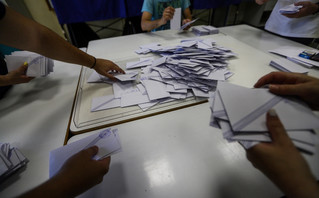Greece is in pre-election rhythms, but without the Prime Minister Kyriakos Mitsotakis to have officially announced the date of the elections, while there are also scenarios for postponement of the electoral process. At the same time, a new survey reports that tele-battles – pre-elections debate on television – have little effect on shaping the opinion of voters, who are more influenced about what they will vote for in the upcoming election by other sources such as the media, political activists, friends or other citizens. This is one of the key findings of a major new international study on the effects of election campaigns on voter turnout.
The researchers, led by Associate Professor Vincent Pons of the Harvard Business School of USA, who made the relevant publication in the internationally prestigious journal of economic sciences The Quarterly Journal of Economics, analyzed data from 62 elections in ten countries (Austria, Canada, Germany, Italy, Netherlands, New Zealand, Sweden, Switzerland, Britain and USA) from in 1952 until recently. Attention was focused on the difference between what they stated before elections the voters that they will vote and what they reported after the election that they voted in the end.
Experts have been debating and arguing for years about how important they really are election campaigns. One view is that the election weeks they are a crucial period, during which many voters evaluate parties and candidates, compare positions and decide, in many cases revising a previous preference. The opposing view is that election campaigns have little to no impact because most people have made up their minds long ago. The new research seems to confirm the first view. The lead researcher B.Pons stated that “election campaigns play a decisive role in all periods and all countries we studied”.
It was found that the 17% to 29% of voters decide what to vote for during the last two months of the election campaign, so those who form their opinion during this period significantly influence the election results. On the last day before the election 12% of voters still don’t know (or won’t say) what they will vote for, so a significant proportion – around one in ten – make up their minds on election day itself. Among the 12% are those who say one party the day before that they will vote and another finally vote on election day. In every election campaign, according to the research, the youngest and the least educated are the ones most affected by the “messages” and information they receive, while – as expected – the “loyal” voters of a party are less affected. Changes in vote choice are primarily influenced by changes in voters’ beliefs about candidates’ positions and characteristics, as well as changes in the “agenda” issues that voters consider most important. In contrast, voters’ preferences for applicable policies generally remain stable throughout the election campaign.

Shock from natural and other disasters such as due to a strong earthquakewhich occur during the pre-election period, do not appear to have changed voters’ decisions (which remains to be confirmed in the case of Turkey). For televised debates in particular, the general picture is that they have little influence on voters. The researchers expressed their surprise that while there is so much “noise” around the telefights, so many people watch them and so many analysts then weigh in on the issue, in reality it’s probably all for nothing, since the debates don’t seem to change the behavior and decision of voters.
According to the researchers, “the findings generally show that even if voters sometimes seem relevant uninformed and indifferenttheir voting choices actually depend on a variety of other information beyond televoting.”
Source: News Beast
With 6 years of experience, I bring to the table captivating and informative writing in the world news category. My expertise covers a range of industries, including tourism, technology, forex and stocks. From brief social media posts to in-depth articles, I am dedicated to creating compelling content for various platforms.






